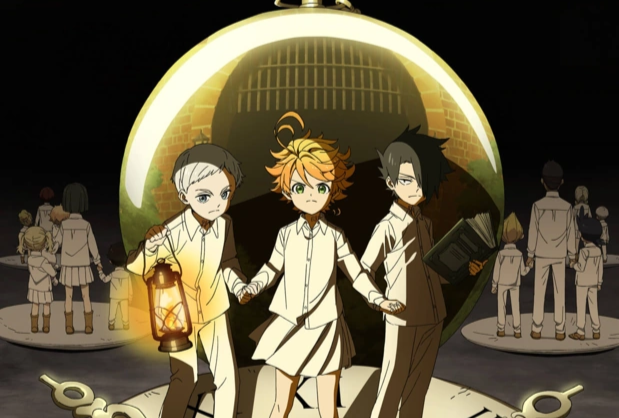Wednesday, April 2
Student Reccomendations: The Promise of A Binge-Worthy Anime
Aiden Mellon ’23 in Arts | May 28, 2023

On the eve of interim writing day, I spent the night at a day student friend’s house. We talked most of the night about our lives and our challenges. When we all had talked enough and gotten tired of it, we set up the bedroom and prepared to sleep, but not before one friend recommended that we project the first episode of an anime called “The Promised Neverland'' onto the ceiling. “The Promised Neverland” is divided into two seasons, each with 12 20-minute episodes. I finished the first season over the course of the week, watching a few episodes at the end of every night—sorry, school meeting speaker on sleep. It is a shame that the studio Cloverworks could not deliver on the second season because the first one was so special, but perhaps this finitude only adds to its power. But why should you, a busy Lawrentian, spend four precious hours on “The Promised Neverland”?
The anime opens with cheery scenes of Grace Field Orphanage. Young orphans, ages two through 11, play and eat and live together in jubilant innocence beneath the tender care of their house mother, Annabelle. But everything is not as it seems. The little world of these children rests on a filthy, stinking secret. When two of the brightest and oldest orphans, Emma and Norman, discover that the “adoption” of their friend Connie actually refers to her death at the hands of the demons, they will stop at nothing to defy their domesticated existence. As harvests approach, jaw-clenching suspense stretches out every interaction between the orphans and their “mother.” But what really made me look forward to my nightly viewing was not so much the thrill of the conflict (though it is electrifying) but the deep, deep emotion that streamed from the anguished protagonists.
“The Promised Neverland” will make your eyes water in hope for these bright young children, and the orphan’s love for one another will no doubt reach into your own heart. Perhaps many Lawrentians can sympathize with kids who often have no one but each other to turn to. I also found that the determination of the orphans, the will to escape with everyone against all odds, reinvigorated my respect for the human spirit and reminded me of that special quality of children to imagine a better world for themselves. Either way, the ghoulish universe of “The Promised Neverland” and its plucky orphans contains enough parallels to our sunny sphere of Lawrenceville to at least make comparison an interesting exercise. So, the next time you find yourself with nothing to do on a long summer night, consider entering “the Promised Neverland.” You will not regret it.
Related Articles
- You Have Bewitched Me, Movie and Book: The Evolution of Pride and Prejudice Celestine Sutter ’27
- Second Form Shakespeare Preview: Julius Caesar Presented by the Class of 2028 Esha Desai ’28
- The Arts Celebrated during Lawrenceville’s Black History Month Melina Kyriakopoulos ’27
- Trump Installs Himself as Chairman of the Kennedy Center Jane Shindnes ’26
- How has “Being Woke’’ Become so Controversial? Mara McKithen ’28
Recent Articles
- Trump Installs Himself as Chairman of the Kennedy Center Jane Shindnes ’26
- You Have Bewitched Me, Movie and Book: The Evolution of Pride and Prejudice Celestine Sutter ’27
- Second Form Shakespeare Preview: Julius Caesar Presented by the Class of 2028 Esha Desai ’28
- The Arts Celebrated during Lawrenceville’s Black History Month Melina Kyriakopoulos ’27
- How has “Being Woke’’ Become so Controversial? Mara McKithen ’28